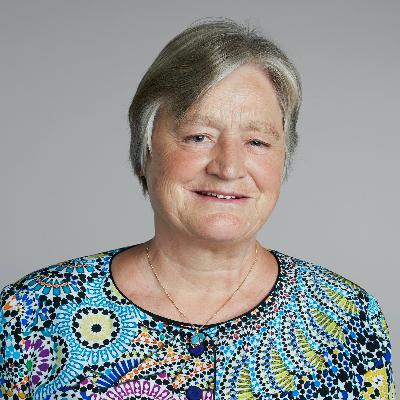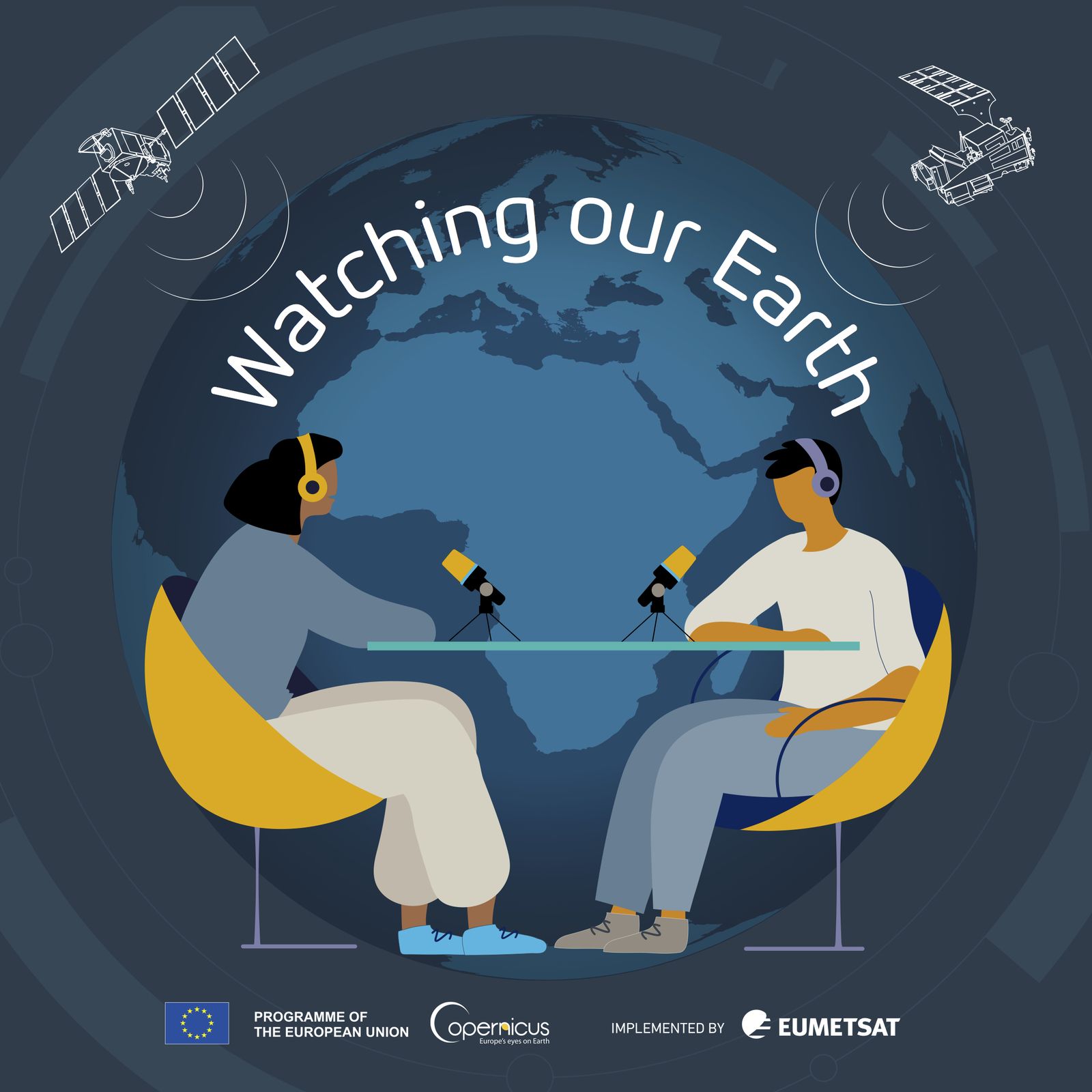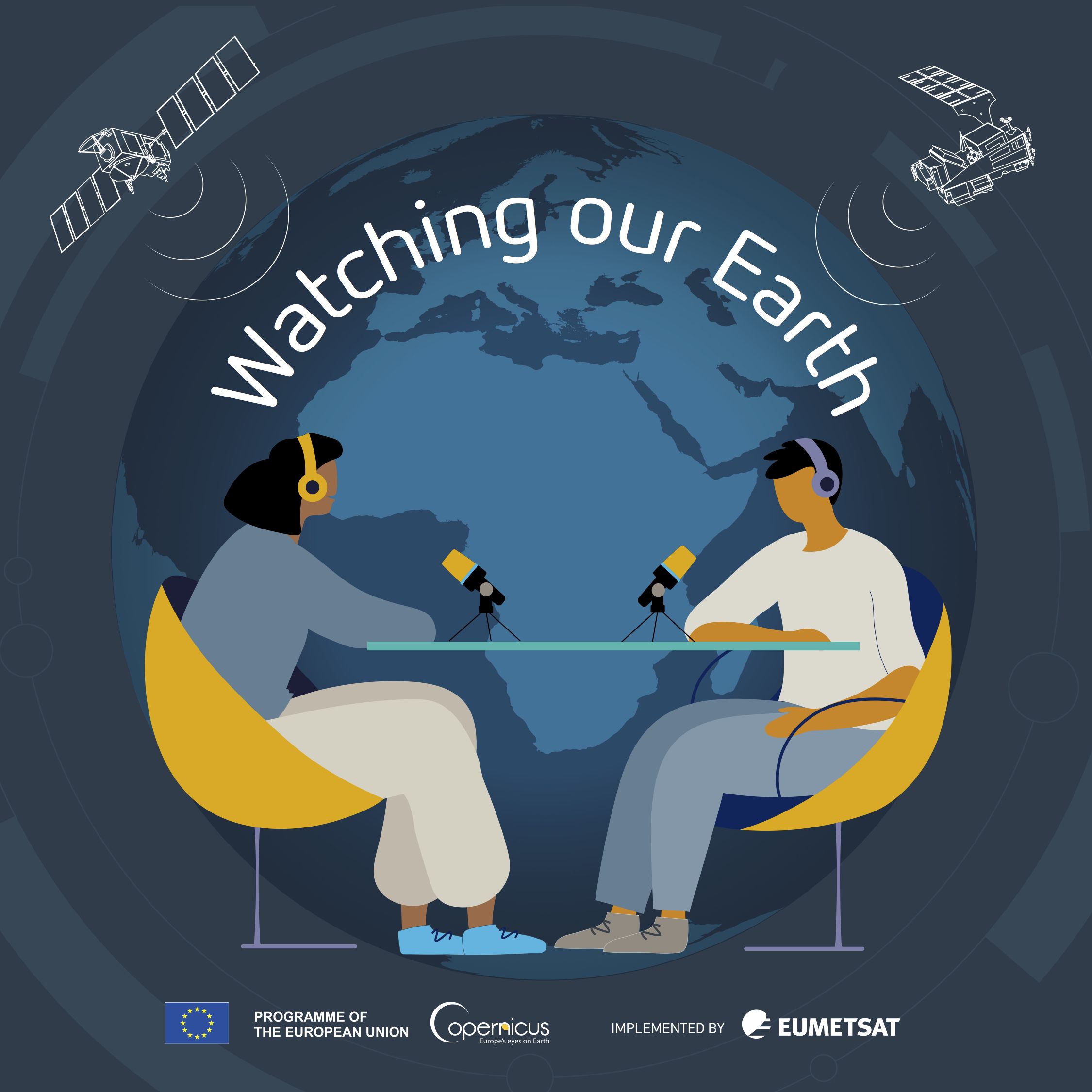Discover Watching our Earth: EUMETSAT Podcasts
Watching our Earth: EUMETSAT Podcasts

Watching our Earth: EUMETSAT Podcasts
Author: EUMETSAT
Subscribed: 7Played: 76Subscribe
Share
© EUMETSAT
Description
Introducing Watching Our Earth, EUMETSAT podcasts series about EUMETSAT and Copernicus Earth observation data.
Find out how Earth observation data benefits our day-to-day lives as we explore the many ways in which satellite data is helping us to better understand the Earth and its environment.
Find out how Earth observation data benefits our day-to-day lives as we explore the many ways in which satellite data is helping us to better understand the Earth and its environment.
24 Episodes
Reverse
The first Day-to-Day podcast explores the topic of ocean observation from space. Host, Dr Mark Higgins (Training Manager at EUMETSAT) talks to Dr Hayley Evers-King (Marine Application Expert) about her most recent ocean case studies and Pierre-Yves Cousteau (Marine Conservationist and Diver) about his exciting new citizen science project, getting divers to record ocean temperature during their dives.
Episode number two looks at an eventful year of fire activity across the planet and how satellites, such as the Copernicus Sentinel satellites, can monitor and deliver data on the environments affected by fires.
Host, Dr Mark Higgins discusses with Federico Fierli (Atmospheric Composition Expert at EUMETSAT) and Mark Parrington (Senior Scientist at the European Centre for Medium-Range Weather Forecasts).
Our latest Day to Day podcast discusses those lovely swirls you see on the ocean surface – but what are they exactly? Episode three will answer this question and more as we return to the seas to discuss “Eddies: the swirling engine of our oceans” with host Mark Higgins and guests, Hayley Evers-King (Marine Applications Expert at EUMETSAT) and Aida Alvera Azcarate (Ocean Remote Sensing Researcher at the University of Liège).
Satellite observations have shown that the impact of COVID-19 is visible from space, as air quality has improved around the world due to restrictions on work and travel, resulting in reduced emissions. In our first fully-remote podcast, find out how services like the Copernicus Atmospheric Monitoring Service (CAMS) are continuing to deliver data to users during this time and what the changes in the atmosphere mean in our latest Day to Day episode featuring host, Mark Higgins and guests Federico Fierli and Stijn Vermoote (ECMWF/CAMS).
Episode five coincides with the International Workshop on Greenhouse Gas Measurements from Space (IWGGMS) taking place on 2-5 June, focusing on topics such as the monitoring of greenhouse gases, the role of satellites and how the data they collect benefits European citizens.
Host, Mark Higgins, discusses with guests, Ruediger Lang (CO2 Project Scientist at EUMETSAT) and Greet Maenhout (European Commission).
Episode six takes us back to the marine world, where we learn how satellite data is used to monitor the marine environment, support maritime safety and help manage fishing activity off the coast of West Africa. Satellites such as Copernicus Sentinel-3 can observe large parts of the ocean from space, providing useful information for management of ocean resources and maritime safety.
Host, Mark Higgins, introduces the subject with guests, Hayley Evers-King (EUMETSAT) and Kwame Adu Agyekum (University of Ghana).
In episode seven, we’re deep-diving into the world of altimetry with expert, Remko Scharroo (EUMETSAT). New to altimetry? No problem, Remko explains exactly what it is and why it’s such an important part of the mission.
The Sentinel-6 Michael Freilich satellite, launched on 21 November 2020, will join the Copernicus Sentinel family and continue the unique record of mean sea level measurements, now with more accurate observations and state-of-the-art instruments on board. EUMETSAT will take over operations of the satellite from the European Space Agency after a three-day testing period, in which checks will be made to ensure everything is working properly.
We hope you enjoy listening to Remko, Hayley Evers-King (EUMETSAT) and host, Mark Higgins in this latest episode and learn more about why Sentinel-6 data will be crucial for climate monitoring and forecasting high-impact weather events.
It’s the 8th episode from our "Day to Day" series, and this time we’re discussing the ocean carbon cycle.
How does carbon enter our oceans? What does it do once it’s there? These questions and more will be answered in this latest episode!
Join host Mark Higgins, Hayley Evers-King (Marine Applications Expert) and guest, Jamie Shutler (Associate Professor in Earth observation at the University of Exeter) for the latest instalment on how Copernicus satellite data can affect our day-to-day lives.
Useful links:
1. Why and how satellite observations are critical for carbon and why this will only increase in the future:
https://esajournals.onlinelibrary.wiley.com/doi/full/10.1002/fee.2129
2. How and why salinity observations from space can help us understand ocean acidification:
https://pubs.acs.org/doi/10.1021/es504849s
3. The story about sea surface temperature, its skin and how we identified why the skin was important for carbon absorption:
https://www.carbonbrief.org/guest-post-the-oceans-are-absorbing-more-carbon-than-previously-thought
4. European Space Agency project, Satellite oceanographic datasets for acidification (OceanSODA).
https://esa-oceansoda.org/
In episode nine we're exploring how climate change can affect coral reef's and the use of satellite's in monitoring their health.
William Skirving (NOAA Coral Reef Watch Senior Scientist) and Anne O'Carroll (EUMETSAT Remote Sensing Scientist) discuss the crucial measuring of sea surface temperature from space with host, Mark Higgins - listen now!
How does a warming Arctic affect the rest of the planet? How do satellite observations help scientists better understand the changing environment?
Mark Higgins chats to regular guest Hayley Evers-King and EUMETSAT’s Chief Scientist, Paolo Ruti, about the shared global challenges of EUMETSAT, Copernicus and international partners in understanding how what we see from space can affect the Earth’s climate, and why our next-generation missions will result in more data and increasingly accurate predictions for the benefit of citizens worldwide.
EUMETSAT Training Manager, Mark Higgins talks to guests Hayley Evers-King (ocean expert at EUMETSAT) and Pierre-Yves Le Traon (Scientific Director at Mercator Océan International) about the world of altimetry and the valuable data we can gather on our oceans, including a better understanding of climate change evolution and circulation of the ocean.
We’re also celebrating 30 years of altimetry measurements from space with the anniversary of the TOPEX/Poseidon mission and the value that this – and the series of reference missions that followed – brings to society, by way of valuable ocean data that is crucial for providing ocean forecasts.
We're very happy to have guest, Professor Dame Julia Slingo (a leading figure in weather and climate research) to talk to us about the impact of climate change, climate simulation and Destination Earth (DestinE) - the ambitious EU initiative to create a digital twin of our planet.
Copernicus is a European system for monitoring the Earth using satellites and in situ sensors. It has made a huge difference in our ability to monitor our planet and understand how it is changing over time.
In this podcast Lieven Bydekerke, Copernicus Programme Manager at EUMETSAT, discusses the many benefits of Copernicus and gives the inside story on EUMETSAT's role supporting the programme.
We've also been celebrating the 25th anniversary of the Copernicus Programme, on 8 June 2023!
In this podcast Noel Fitzpatrick, research meteorologist at the Irish National Weather Service (Met Éireann), discusses the big impact that new satellites - such as Meteosat Third Generation (MTG-I1) - and AI and machine learning techniques will have on weather forecast accuracy and weather warnings.
In this episode, EUMETSAT Chief Scientist Paolo Ruti discusses the possibilities for AI in weather forecasting with EUMETSAT's Lead Marine Application Expert, Hayley Evers-King.
Listen to find out how we are planning for the future and how AI will impact the way we work 🛰️
In this latest episode, EUMETSAT CO2 Project Scientist Ruediger Lang discusses the future
Copernicus Anthropogenic Carbon Dioxide Monitoring constellation (CO2M) satellites, with host and EUMETSAT's Training Manager, Mark Higgins.
Listen to find out more about what the satellite will measure, including its importance for climate monitoring and research 🛰️
One focus for innovation in the coming years is artificial intelligence, which is driving change in many fields such as remote sensing and operational weather forecasting.
EUMETSAT's Chief Scientist Paolo Ruti shares knowledge with a broader audience and foster discussion on technical innovations at EUMETSAT and its partner organisations.
The new Podcast series "Forecasting innovation" includes topics such as machine learning in various sectors, cloud data storage, new satellite applications, and emerging technologies like quantum computing.
One focus for innovation in the coming years is artificial intelligence, which is driving change in many fields such as remote sensing and operational weather forecasting.
EUMETSAT's Chief Scientist Paolo Ruti shares knowledge with a broader audience and foster discussion on technical innovations at EUMETSAT and its partner organisations.
The new Podcast series "Forecasting innovation" includes topics such as machine learning in various sectors, cloud data storage, new satellite applications, and emerging technologies like quantum computing.
One focus for innovation in the coming years is artificial intelligence, which is driving change in many fields such as remote sensing and operational weather forecasting.
EUMETSAT's Chief Scientist Paolo Ruti shares knowledge with a broader audience and foster discussion on technical innovations at EUMETSAT and its partner organisations.
The new Podcast series "Forecasting innovation" includes topics such as machine learning in various sectors, cloud data storage, new satellite applications, and emerging technologies like quantum computing.
One focus for innovation in the coming years is artificial intelligence, which is driving change in many fields such as remote sensing and operational weather forecasting.
EUMETSAT's Chief Scientist Paolo Ruti shares knowledge with a broader audience and foster discussion on technical innovations at EUMETSAT and its partner organisations.
The new Podcast series "Forecasting innovation" includes topics such as machine learning in various sectors, cloud data storage, new satellite applications, and emerging technologies like quantum computing.




















